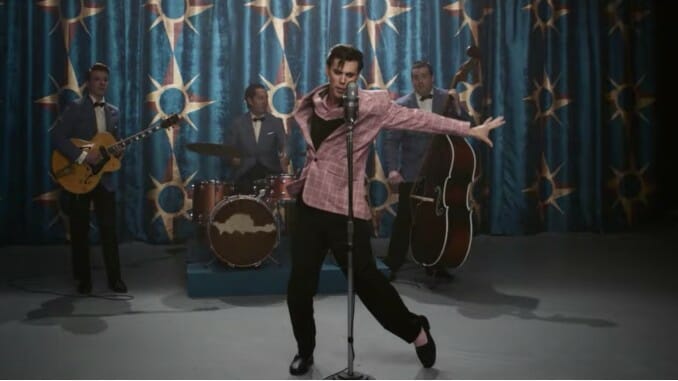Elvis Is a Sprawling, Frustratingly Sanitized American Epic

More somatic threat than motion picture, Baz Luhrmann’s Elvis—the rhinestoned belt buckle of musical biopics—is like a sneeze into a bullhorn: Incoherent at volcanic decibels. Luhrmann’s sprawling, confused epic spans the entirety of Elvis Presley’s professional career, from his Sun Records days to his controversial leg shaking, Vegas residency and Paramount Pictures deal. True to life, Elvis (Austin Butler) does not pilot the narrative. The film is more of a cautionary tale about corporate sovereignty by way of Colonel Tom Parker (Tom Hanks), the avaricious manager who ushered the young star into a record deal with RCA Victor and many subsequent Hollywood pictures before gambling away his hefty profits.
All of Luhrmann’s maximalist flavors are on display: Breakneck editing, splashy scenery, crotch shots, selective overacting (the culprit here being Kodi Smit-McPhee’s Jimmie Rodgers Snow, a delight). The film’s first hour echoes Luhrmann’s The Great Gatsby most patently, splicing songs by Doja Cat and Denzel Curry into its conservative setting and throwing editing etiquette to the wind. It’s a film so enamored by the idea of Elvis, unencumbered by the thornier specifics of his life which might burst its central bubble of leather suits, red bulbs and honky-tonk goodwill.
Admittedly, the trailer did wrong by Butler, clipping together some of his worst line readings and lip curling. Butler’s Elvis is mostly charming, conjuring the star’s recognizable gestures without sliding into caricature—no easy feat when playing perhaps the most imitated man of all time. Especially in Elvis’ early days, where Butler sings and hip-thrusts in zoot suits, he superbly encapsulates a jittery young man realizing his potential in real time. (Denzel Washington cold-called Luhrmann to recommend Butler for the role after acting alongside him in the 2018 stage revival of The Iceman Cometh.)
The trailer was right on the money about Hanks, however, whose performance skates far past bizarre or camp and into truly abject territory. In what was presumably an effort to ridicule Parker, Hanks and Luhrmann cheapen the circumstances, making Parker’s manipulation appear clownish rather than deliberate. Tacking distracting prosthetics onto Hanks and having him saunter around slot machines with a walker while relaying the details of his fraught relationship to Elvis is forgivable, but the Proto-Slavic accent is sinful.
-

-

-

-

-

-

-

-

-

-

-

-

-

-

-

-

-

-

-

-

-

-

-

-

-

-

-

-

-

-

-

-

-

-

-

-

-

-

-

-








































